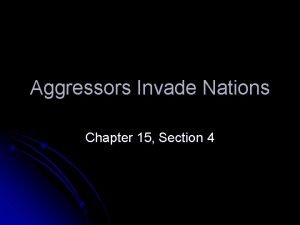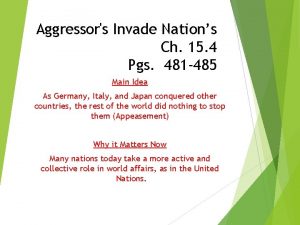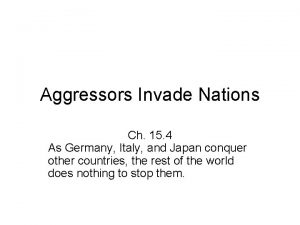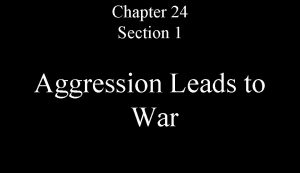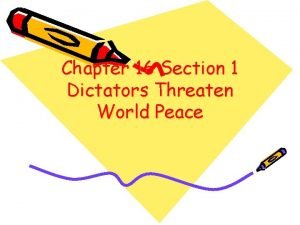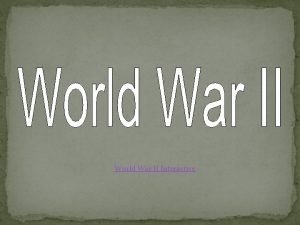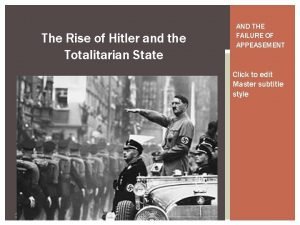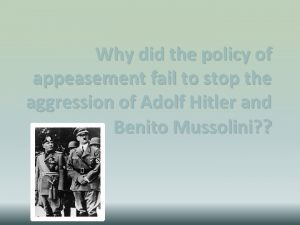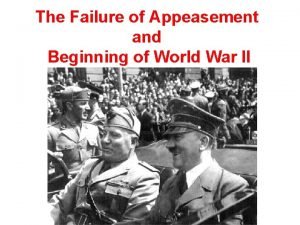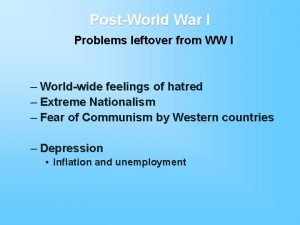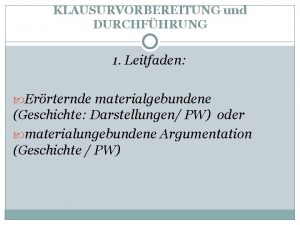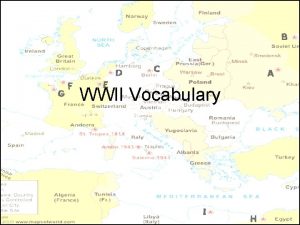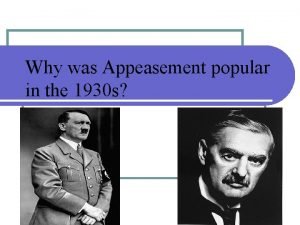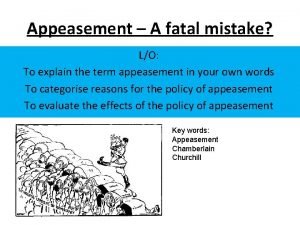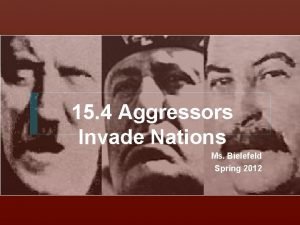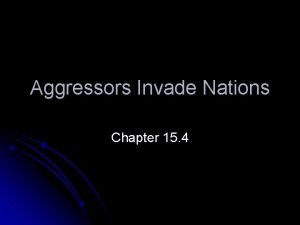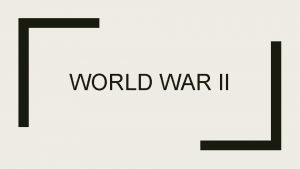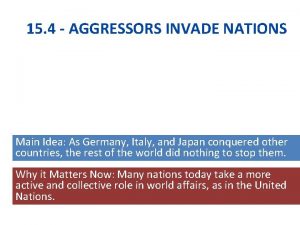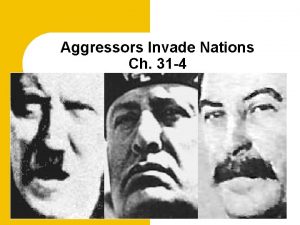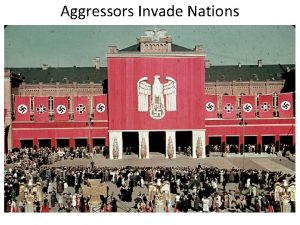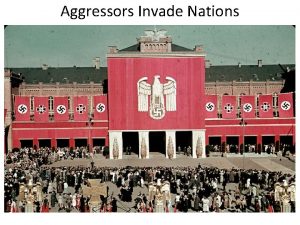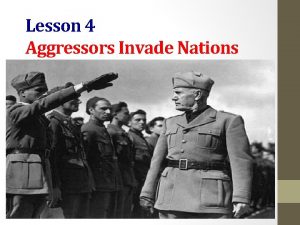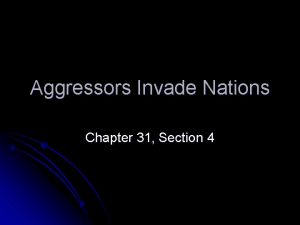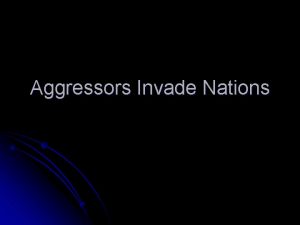Aggressors Invade Nations Appeasement Militarists Take Control of


















- Slides: 18

Aggressors Invade Nations Appeasement

Militarists Take Control of Japan l l l Emperor Hirohito as head of state won popular support for the army leaders who ruled in his name. Japan’s militarists were extreme nationalists. They wanted to solve the country’s economic problems through foreign expansion. Pacific empire included the need to conquer China to get raw materials, markets and room for expansion.

Japan Invades Manchuria l Japanese businesses had invested heavily in Manchuria. l l l rich in iron and coal 1931—the Japanese army seized Manchuria, despite objections from the Japanese parliament. The army then set up a puppet government. Japanese engineers and technicians began arriving in large numbers to build mines and factories.

Japan Invades Manchuria 2 Attack on Manchuria was the first direct challenge to the League of Nations. l League’s members included all major democracies except the United States. l The League included the three countries that posed the greatest threat to peace—Germany, Japan, and Italy. #1 l Many League members vigorously protested, but took no action. Japan withdrew from the League in 1933. l

European Aggressors on the March l The League’s failure to stop the Japanese encouraged European Fascists to plan aggression of their own. The Italian leader Mussolini dreamed of building a colonial empire in Africa like those of Britain and France.

Mussolini Attacks Ethiopia was one of Africa’s three independent nations. l Mussolini attacked Ethiopia in revenge for a failed attempt of Italy so set up a colony in the 1890 s. #2 The Ethiopian emperor, Haile Selassie, urgently appealed to the League for help. The League condemned the attack, but did nothing. l Britain controlled the Suez canal, but let Italy through with ships and supplies in order to keep the peace. l

Hitler Defies Versailles Treaty Hitler had long pledged to undo the Versailles Treaty. l The treaty limited the size of Germany’s army. #3 In March 1935, Hitler announced that Germany would not obey these restrictions. The League issued only a mild condemnation. l

Hitler Defies Versailles Treaty 2 Hitler then re-militarized the Rhineland which was forbidden by the Versailles Treaty as a buffer between France and Germany. It was also an important industrial area. #4 Stunned, the French were unwilling to risk war. l The British urged appeasement, giving in to an aggressor to keep peace. l

Hitler Defies Versailles Treaty 4 #5 Hitler’s growing strength convinced Mussolini that he should seek an alliance with Germany. In October 1936, the two dictators reached an agreement that became known as the Rome-Berlin Axis. A month later, Germany also made an agreement with Japan. Germany, Italy, and Japan came to be called the Axis Powers.

Democratic Nations Try to Preserve Peace #6 Instead of taking a stand against Fascist aggression in the 1930 s, Britain and France repeatedly made concessions, 1) hoping to keep peace. Both nations were 2) dealing with serious economic problems as a result of the Great Depression. In addition, the horrors of World War I had created a 3) deep desire to avoid war.

United States Follows an Isolationist Policy #7 Many Americans supported isolationism, the belief that political ties to other countries should be avoided. Isolationists argued that entry into World War I had been a costly error. Beginning in 1935, Congress passed three Neutrality Acts. These laws banned loans and the sale of arms to nations at war.

The German Reich Expands l On November 5, 1937, Hitler announced to his advisers his plans to absorb Austria and Czechoslovakia into the Third Reich (ryk), or German Empire. The Treaty of Versailles prohibited Anschluss (AHN • SHLUS), or a union between Austria and Germany. However, many Austrians supported unity with Germany. In March 1938, Hitler sent his army into Austria and annexed it. France and Britain ignored their pledge to protect Austrian independence.

The German Reich Expands l Hitler next turned to Czechoslovakia. About three million German-speaking people lived in the western border regions of Czechoslovakia called the Sudetenland. (See map, page 895. ) This heavily fortified area formed the Czechs’ main defense against Germany. The Anschluss raised pro-Nazi feelings among Sudeten Germans. In September 1938, Hitler demanded that the Sudetenland be given to Germany. The Czechs refused and asked France for help.

Britain and France Again Choose Appeasement #9 France and Britain were preparing for war when Mussolini proposed a meeting of Germany, France, Britain, and Italy in Munich, Germany. The Munich Conference was held on September 29, 1938. The Czechs were not invited. British prime minister Neville Chamberlain believed that he could preserve peace by giving in to Hitler’s demand. Britain and France agreed that Hitler could take the Sudetenland. In exchange, Hitler pledged to respect Czechoslovakia’s new borders.

Britain and France Again Choose Appeasement 2 l When Chamberlain returned to London, he told cheering crowds, “I believe it is peace for our time. ” Winston Churchill, then a member of the British Parliament, strongly disagreed. He opposed the appeasement policy and gloomily warned of its consequences:

Britain and France Again Choose Appeasement #9 Less than six months after the Munich meeting, Hitler took Czechoslovakia. Soon after, Mussolini seized Albania. Then Hitler demanded that Poland return the former German port of Danzig. The Poles refused and turned to Britain and France for aid. But appeasement had convinced Hitler that neither nation would risk war. #10 Britain and France guaranteed Polish independence.

Nazis and Soviets Sign Nonaggression Pact l Britain and France asked the Soviet Union to join them in stopping Hitler’s aggression. As Stalin talked with Britain and France, he also bargained with Hitler. The two dictators reached an agreement. Once bitter enemies, Fascist Germany and Communist Russia now publicly pledged never to attack one another. #11 On August 23, 1939, their leaders signed a nonaggression pact. As the Axis Powers moved unchecked at the end of the decade, war appeared inevitable.

At what point do you think Hitler knew he could do what he wanted?
 Aggressors invade nations chapter 31 section 4
Aggressors invade nations chapter 31 section 4 Aggressors invade nations
Aggressors invade nations Aggressors invade nations
Aggressors invade nations Why was the munich conference unsuccessful
Why was the munich conference unsuccessful Japanese militarists political movement and beliefs
Japanese militarists political movement and beliefs Japanese militarists aggressive actions
Japanese militarists aggressive actions Japanese militarists political movement and beliefs
Japanese militarists political movement and beliefs Mussolini death
Mussolini death David low appeasement cartoon
David low appeasement cartoon Why did the
Why did the The failure of appeasement
The failure of appeasement Define appeasement
Define appeasement Appeasement
Appeasement Was the policy of appeasement justified
Was the policy of appeasement justified Appeasement politik
Appeasement politik Atlantic charter
Atlantic charter Why was appeasement popular
Why was appeasement popular Brady glasser
Brady glasser Was appeasement a mistake
Was appeasement a mistake
